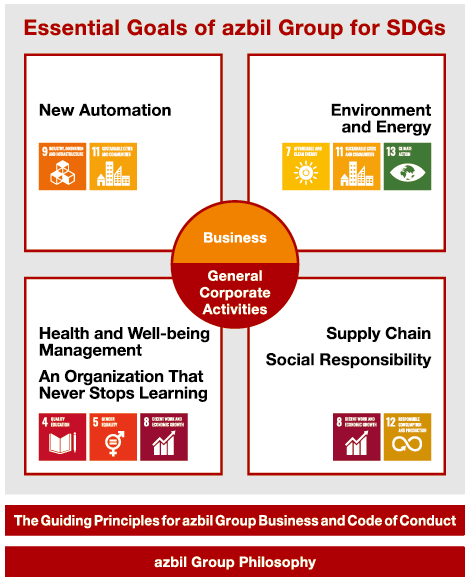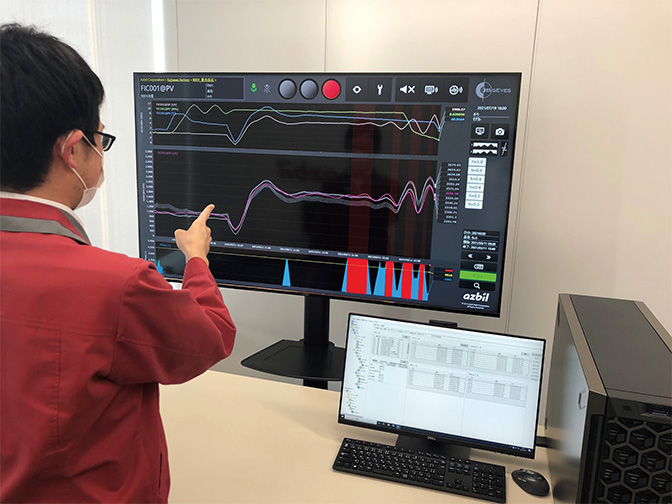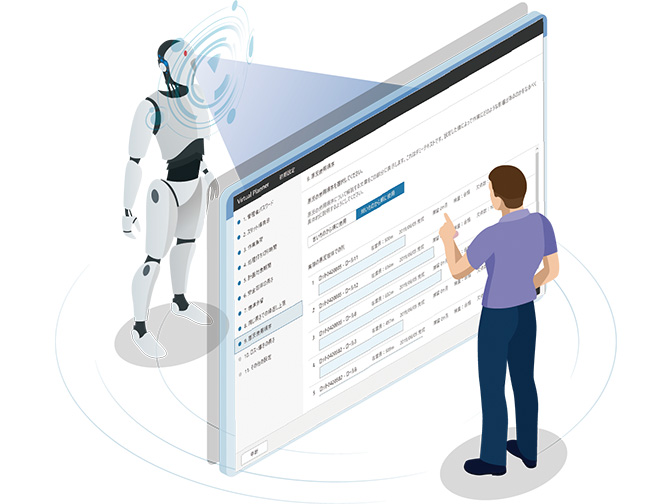Essential Goals of azbil Group for SDGs
The essential goals of azbil Group for SDGs consist of targets relevant to achieving the four essential goals. We established new targets for the essential goals. By ensuring that all of our employees understand the goals and communicate further with our stakeholders during the course of our activities, we can collaborate with our customers, business partners, and local communities to accelerate cooperative creation aimed at solving societal problems and contribute to sustained growth for society as a whole.
Click here for more information about “Essential Goals of azbil Group for SDGs” “ FY2024 results, initiatives, and topics.”

Essential Goal I Environment and Energy
Preserving the Earth’s Environment and Solving Energy-Related Problems through Cooperative Creation
Solving global environmental problems is a prerequisite for achieving a sustainable society, and it is one of the key issues of the SDGs. The azbil Group recognizes that responding to climate change is a priority, and we have set solutions for energy toward a decarbonized society and realizing environment-integrated management as our targets to achieve the SDGs.
Solutions for Energy (Toward a Decarbonized Society)
Further Effective Reduction of CO2 at Customers’ Sites
We offer products, services, and solutions that help our customers reduce CO2 emissions at their sites. We strive to reduce society’s environmental impacts by providing automation equipment and systems for process optimization and stabilization, energy management, and other solutions to achieve a reduction in energy use and CO2 emissions by way of maintenance and services on those equipment and systems after delivery. We help to reduce environmental impacts throughout our customer’s product life cycles.
| Fiscal Year 2030 Targets |
|---|
| The target of effective CO2 reduction at customers’ sites 3.40 million metric tons of CO2/year |
Click here for more information about the effective reduction of CO2 at customers’ sites.
Greenhouse gas (GHG) emission reduction
Since 2020, we have been working toward realizing carbon neutrality, as laid out in our 2050 Long-Term Vision for Reducing GHG Emissions; this aims to reduce GHG emissions from our business activities (scopes 1+2)*1 to substantially zero by 2050. As our new long-term vision, we have set a target of achieving net zero by reducing emissions by more than 90% (compared to FY2017 levels) throughout the value chain (scopes 1+2+3) and neutralizing residual emissions*2. In line with this, the FY2030 target for reducing indirect GHG emissions (scope 3) throughout the value chain (excluding scopes 1+2) has been raised from 20% to 33% (compared to FY2017 levels). This new long-term vision satisfies the SBTi criteria and has received net-zero certification.
| Fiscal Year 2030 Targets |
|---|
| GHG emissions from business activities (scopes 1+2) 55% reduction (from 2017 base year) |
| GHG emissions throughout the entire supply chain (scope 3) 33% reduction (from 2017 base year) |
Click here for results of GHG emission reduction initiatives.
*1 Scope 1: Direct GHG emissions from the business itself (fuel combustion, industrial processes)
Scope 2: Indirect emissions related to the use of electricity, heat and steam supplied by other companies
Scope 3: Emissions from other companies associated with the business’s activities (indirect emissions other than those covered by scopes 1 and 2)
*2 Residual emissions: GHG emissions within the azbil Group value chain that cannot be fully eliminated.
Environmental Preservation (Realization of Integrated Environmental Corporate Management*1)
Creation and provision of eco-friendly products and services
Through the creation and provision of sustainable products aimed at solving problems in three environmental priority areas— decarbonization, resource recycling, and biodiversity conservation—we are contributing to solving society’s environmental problems by integrating environmental issues into our business activities through integrated environmental corporate management.
| Fiscal Year 2030 Targets |
|---|
| Designing all new products to meet the azbil Group’s own sustainability standards*2 |
| Fiscal Year 2030 Targets |
|---|
| Increase the number of skilled professionals*3for supporting sustainable services*4provided by the azbil Group to a total of 1,800*4—triple the number in FY2021 |
Effective Use of Natural Resources*5 and Reduction in the Amount of Waste
For new product development, we have set a target to design all new products to be 100% recyclable through our Reduce, Reuse, Recycle (3R) initiatives.
| Fiscal Year 2030 Targets |
|---|
| Design all new products to be 100% recyclable |
*1 Management that comprehensively incorporates a wide range of environmental activities including decarbonization, resource circulation, and biodiversity conservation into business operations.
*2 This design strives to create and provide products that contribute to solving global environmental issues (decarbonization, resource circulation, and biodiversity).
Overall evaluation based on the following:
- product life cycle CO2
- Indicates for resource consumption, and resource recycling
- Assessments regarding decarbonization, resource recycling, pollution prevention, and information disclosure
*3 As well as contributing, through our automation technologies, to productivity improvements and stable operations at our customers’ sites, we offer field engineering services that can contribute to the realization of a sustainable society by solving environmental challenges that face our customers and society in all three of our environmental priority areas (decarbonization, resource recycling, and biodiversity conservation).
*4 We have set up an in-house qualification system for employees with the following specialized skills, which are considered vital for realizing solutions to issues in our three environmental priority areas.
∙ Professionals licensed for network services, such as remote maintenance of large-scale buildings, energy management, and cloud services
∙ Certified professionals in the fields of advanced plant/factory control, energy-saving solution technologies, and valve maintenance
*5 Total number of qualified personnel including those who have acquired multiple professional skills (counted separately for this purpose) to adapt to emerging technological innovation in field engineering service
Essential Goal Ⅱ New Automation
Realizing a Safe and Comfortable Society with New Automation
In today’s rapidly changing business environment, there is demand for data-backed management, operations and environmental measures.
New automation*1 improves the sustainability of customers’ production sites and work environments by resolving the impacts of factors that impede sustainability(e.g. equipment malfunction, a declining workforce, etc.) that cannot be solved by conventional automation alone.
Specific target products and services will range from the provision of advanced measurement equipment featuring MEMS technology to the provision of cloudbased services in offices and plants, as well as autonomous systems utilizing AI and data.
By expanding partnerships with companies involved in a variety of fields as well as various research institutes, and by fully implementing our technologies and knowledge in society, we will achieve business growth and contribute to realizing the SDGs.
*1 Automation is achieved through the four stages of: (1) monitoring; (2) control; (3) optimization; and (4) autonomy. Autonomy occurs at the highest level, and autonomous systems enable minimum human intervention and reduce problems caused by human error or equipment malfunctions. We also highlight New Automation as a technology that can help to solve a range of societal problems that have emerged in recent years, including resolving manpower shortages at worksites, reducing psychological burdens, promoting work-style reform, minimizing economic losses, maximizing energy efficiency, reducing industrial waste, and preventing accidents and disasters.
| Fiscal Year 2030 Targets |
|---|
|
We will achieve a state of resilience to changes in the business |
*2 As of April 2022, 530 business sites were in operation. The aim is to increase this 15-fold to 8,000 sites by 2030.
*3 Provided to 600,000 people, as of April 2022. The aim is to increase this 10-fold to 6 million people by 2030.
Providing Productivity and Higher Value That Lead to Customers’ Peace of Mind and Comfort
Autonomous Systems in Production Spaces
The autonomous systems built by the azbil Group independently devise the most logical and efficient action plan for the assigned production target (production volume), and then execute the tasks optimally through coordination between existing automation equipment and control software. During this process, the autonomous system foresees malfunctions (e.g., quality defects, equipment failure); devises revised pro-duction conditions or maintenance commands and other workarounds as needed; and works to minimize production costs, waste volumes, and CO2 emissions. With the autonomous system actively repeating this sort of cycle, it is possible to reduce human intervention and achieve productivity on a completely different scale than before.
| Development Example 1 | Development Example 2 |
|---|---|
Online Anomaly Detection System Our online anomaly monitoring system utilizes big data from operations of production equipment at factories and plants for AI-driven learning. The system provides real-time monitoring of quality, equipment, utilities, and environmental load and detects minute changes that are warning signs of future problems. The system is currently installed at over 50 sites for manufacturing and power generation customers and is operating over 5,000 AI models. These systems have also contributed to promoting remote operations during the COVID-19 pandemic and cultivating technical skills at the production sites, as well as to reducing manpower. AI detects signs of anomalies from minute changes in environmental variables |
Automatic Optimization Scheduling System  Automatically create a production plan suited to the situation |
Essential Goal Ⅲ Supply Chain, Social Responsibility
Fulfilling Our Responsibilities to Society across Our Supply Chain and Contributing to Local Communities
One of the Guiding Principles is our desire to build long-term partnerships with stakeholders. For the supply chain, we act in line with our Group philosophy and Guiding Principles, under-standing and complying with all laws and regulations and expanding worldwide in an equitable way with due consideration given to human rights and the environment. For our initiatives, we are working to implement corporate social responsibility (CSR) throughout the supply chain by helping our business partners to understand our philosophy, principles, and the efforts we undertake.
Regarding our contributions to communities and societies where we operate, we engage in a wide range of initiatives, from grassroots efforts undertaken voluntarily by employees to offering donations to areas affected by the disasters.
Fulfilling Social Responsibility with Customers and Business Partners
Sharing CSR Values across the Supply Chain
To fulfill our social responsibility across the supply chain, in 2021, the azbil Group reviewed and amended our Essential Goals of azbil Group for SDGs and developed original indica-tors in 10 major areas (see table at right), drawing on evaluations of ESG by the FTSE and other external institutions. We plan to share these indicators with our business partners and to implement CSR activities that the azbil Group is known for — ones that utilize the knowledge the Group has built up over many years in such areas as environment, quality, compliance, and health and well-being management.
We will evaluate the direction, framework, initiatives, and effectiveness of these activities using a four-tiered system to review independent achievement levels. We will also collect the results of customer questionnaires. Through this scheme that includes the four-tiered evaluation and the review, we aim to promote ongoing collaboration and improvements with our business partners, as well as solutions to environmental and societal issues and other types of shared CSR value in the supply chain.
Major areas of indicators for evaluation across the supply chain
| Main category | Sub-category |
|---|---|
| Environmental supply chain | Climate change Pollution & resources Water security & water risk Biodiversity Environmental management |
| Social supply chain | Labor practices Health and safety Human rights Communities (regional society) Quality & customers |
| Fiscal Year 2030 Targets |
|---|
| Working with our business partners on achieving the SDGs as a common goal and creating shared CSR value across the supply chain |
Invigorating Local Communities
Implementing Community-Based Social Contribution Activities across All Offices
In conjunction with the revisions to the Essential Goals for the SDGs, the azbil Group has also formulated the “aims” and “key themes” for the initiatives being run under the essential goal of “Implementing community-based social contribution activities across all the azbil Group’s offices with each employee actively participating.” In addition, to facilitate the practice of continuous and systematic activities, the Social Contribution Promotion Office was established in April 2021. Our aim is to contribute “in series” to the achievement of a sustainable society, by training every employee to tackle social problems in Japan and overseas with a focus on issues such as preservation of the global environment and how we foster the next generation.
- Aims
- We aim to achieve a sense of solidarity and accomplishment as the azbil Group by establishing a corporate culture that helps individual employees to plan and implement solutions to societal problems and achieve ongoing personal growth, and to participate in initiatives that bring individual employees together with various stakeholders.
- Key themes
- ・Areas involving the global environment
・Areas involving people (particularly fostering the next generation)
| Fiscal Year 2030 Targets |
|---|
| Social contribution activities rooted in local communities are run at all our business sites,*1 with the active participation of every employee.*2 |
*1 All offices, both in Japan and overseas
*2 The azbil Group aims to participate in activities of a scale that can accommodate the total number of employees.
Click here for more information about azbil Group’s social contribution.
Essential Goal Ⅳ Health and Well-being Management, An Organization That Never Stops Learning
Strengthening Our Foundation to Solve Societal Problems through Health and Well-being Management and Continuous Learning
Another of the azbil Group’s essential goals for the SDGs is to strengthen its foundation to solve societal problems through health and well-being management and continuous learning. We are developing various measures based on feedback from employee satisfaction survey and are running a range of different human resource development programs to promote job satisfaction and personal growth in employees from diverse backgrounds, while also motivating staff to engage in business activities that contribute “in series” to a sustainable society.
Implementing Health and Well-being Management (Job Satisfaction, Health, Diversity and Inclusion)
Implementing Health and Well-being Management That Revolves around Work Style Reform and Diversity and Inclusion
In 2019, we announced the azbil Group “Health and Well-be-ing Declaration,” which revolves around work style reform and diversity. To make workplaces and employees healthy, happy, and lively, we are focusing on measures to improve job satis-faction for our employees and to promote greater diversity in the workforce so that women and other diverse human re-sources can play an active role.
The employee satisfaction survey conducted every year has demonstrated that for job satisfaction, there is a strong correlation between “the value of own work” and “trust and appraisal from supervisor.” We are therefore providing coaching & leadership training for employees in managerial roles across the azbil Group to improve subordinate recognition and motivational capabilities as well as organizational energy. We have changed the focus of our programs from the previous concept of “turning minus into zero” (measures on health and safety, and work-life balance) to “turning zero into plus” (measures to promote self-efficacy and organizational energy), which may help increase employee job satisfaction even further.
| Fiscal Year 2030 Targets |
|---|
| Achieve a 65% or more*2 ratio of employees who find satisfaction in working at the azbil Group |
*1 Points tallied internally with weight given based on the role, such as company executive, officer, and manager.
*2 Employee satisfaction survey conducted annually.
<New targets from FY2025>
| Fiscal Year 2030 Targets |
|---|
| Percentage of female employees at managerial or specialist positions to be 10% or more*3 |
| Fiscal Year 2027 Targets |
| Approximately double*4 the percentage of female employees at managerial or specialist positions across the azbil Group in Japan by FY2027 (versus FY2017) |
*3 Azbil Corporation’s target is for female employees in managerial or specialist positions to represent at least 10% of all employees in managerial or specialist positionss.
*4 The base year for our target is FY2017 because in FY2018 we revised our personnel system to incorporate measures for women’s advancement.
Health and well-being management overview

Click here for more information about Health and Well-being Management.
Developing and Strengthening an Organization That Never Stops Learning
Developing Human Resources as an Organization That Never Stops Learning
An organization that never stops learning can respond flexibly to changes in the business environment and promote operational reforms through the creation of new business and new ways of working, so that each employee grows autonomously to become a globally engaged human resource.
To continuously develop such human resources, the azbil Group is adding to its existing training programs by expanding opportunities to learn with stakeholders, including technical training with distributors, partner companies, and customers, as well as site tours for local community members. We also offer employee training that allows employees to experience personal growth through diligent study.
To encourage career development through various experiences provided at work and foster employees’ personal growth, the azbil Group has defined two indicators of progress: a point system to log educational opportunities, and the ratio of employees who experienced personal growth over the past year. These benchmarks guide our activities as an organization that never stops learning.
| Fiscal Year 2030 Targets |
|---|
| Achieve a 65% or more*3 ratio of employees who experienced personal growth over the past year |
*3 Employee satisfaction survey conducted annually.
Click here for more information about personnel development by Azbil Academy.
